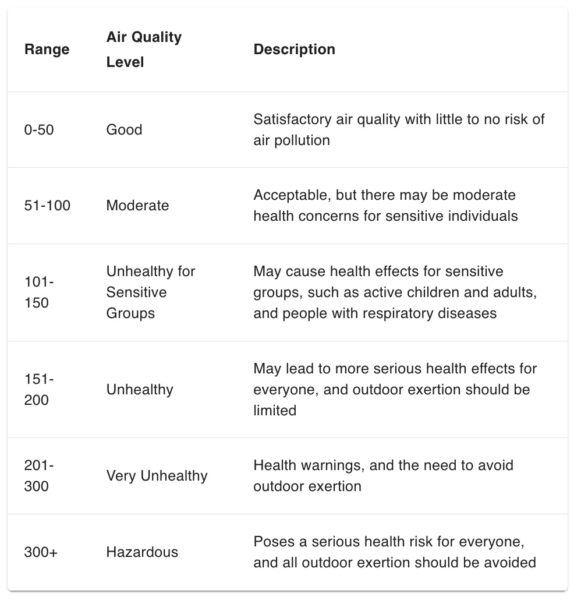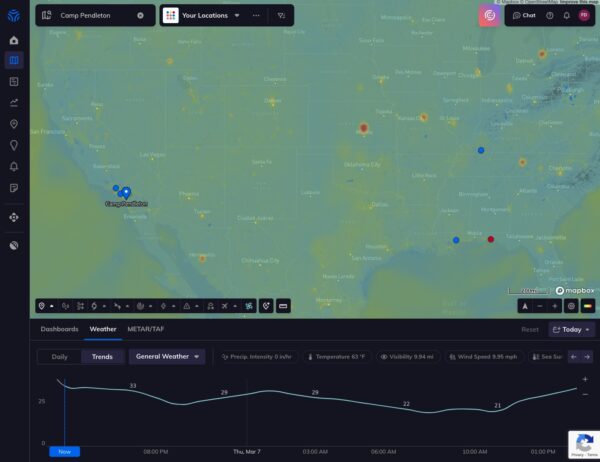TL;DR:
- Air quality is crucial for health and well-being, with various pollutants affecting the environment and communities.
- Tomorrow.io, OpenAQ, AirVisual, AirNow, and Air Quality Index are top alternatives to BreezoMeter for detailed and frequently updated air quality data.
- Understanding air quality helps protect against the effects of pollution and supports healthier communities.
- APIs offer detailed information on pollutants, their impacts, and sources, aiding in better understanding of local air quality.
- Access to quality air quality data is essential for safeguarding health and well-being.
Did you know that air quality can affect your health and well-being?
Nowadays, people are becoming more aware of the air they breathe and the effects of air pollution on their lives. To help understand local air quality, many companies provide Air Quality Index (AQI) data through APIs.
One of the most popular air quality APIs is BreezoMeter’s air quality API, but plenty of other options exist that could better meet your needs.
In this article, we’ll explore what we think are the top 5 air quality API alternatives to the BreezoMeter API. We’ll take a look at the features and benefits each one offers and how you can use them to better understand the air you breathe and the impact it has on you and your community.
Why is Air Quality Important?
Air quality is crucial for protecting our environment, fostering healthy communities, and enabling businesses to thrive.
The EPA has established an AQI for five major air pollutants that the Clean Air Act regulates:
- Ground-level Ozone
- Particle Pollution (also known as particulate matter, including PM2.5 and PM10)
- Carbon Monoxide
- Sulfur Dioxide
- Nitrogen Dioxide
Air pollution damages the environment, harming vegetation, acidifying waters, and disrupting wildlife. It reduces visibility, obscures scenic vistas, and degrades the aesthetic values that communities enjoy.
For businesses, air pollution impedes operations that rely on predictable air conditions, like aviation and renewable energy generation. It also leads to lower worker productivity from increased illness-related absences.
Technological advances and stricter environmental regulations have improved air quality in many areas. But more progress is still needed to reduce greenhouse gas emissions and curb pollution from sources like transportation, power generation, and intensive industry.
Sustained investment and diligent monitoring can help safeguard clean air and help bring accurate air quality data to the communities and businesses that need it.
Understanding the Air Quality Index (AQI)
The Air Quality Index (AQI) is a measure of air pollution levels and is categorized into six ranges:
- Good
- Moderate
- Unhealthy for Sensitive Groups
- Unhealthy
- Very Unhealthy
- and Hazardous
Each range has specific health implications and recommendations for outdoor activities.

These days you can track air quality via your favorite weather app, or with an air quality weather API.
With an Air Quality weather API, you can access current and forecast air quality data for any location worldwide.
1. Tomorrow.io Air Quality Data Layers
Tomorrow.io offers Air Quality Data Layers through a comprehensive Weather API that provides global air quality data from over 30,000 sources.
The Tomorrow.io weather API offers real-time data for over 60 countries, with more being added regularly. The data is updated every 15 minutes, so you can always have access to the latest information.
Tomorrow.io’s air quality offering includes both US and China EPA index parameters, along with PM<10 (dust), PM<2.5 (not visible), Ozone (fuel+radiation), CO, SO, NO2, and SO2 levels.
The Weather API is easy to use, and users can integrate with many different services. It also offers detailed information on the different pollutants and their impacts on health, as well as the ability to set thresholds and get alerts when the air quality reaches a certain level.
The Air Quality Data Layers API is a great alternative to BreezoMeter, as it offers more detailed information and is updated more frequently.

Air Quality Weather Data via the Tomorrow.io Weather Intelligence Platform
The Weather API is easy to use, and users can integrate with many different services. It also offers detailed information on the different pollutants and their impacts on health, as well as the ability to set thresholds and get alerts when the air quality reaches a certain level.
The Air Quality weather API is a great alternative to BreezoMeter, as it offers more detailed information and is updated more frequently. Tomorrow.io’s weather API can also be overlayed any map including Google Maps, MapBox, Apple Maps, and more, whereas Breezometer is only licensed for Google Maps.
Plus, you get seamless integration with mobile apps when using Tomorrow.ios weather API. This allows developers to incorporate accurate and reliable weather data into their applications. This integration enables users to access real-time weather updates and forecasts directly from their favorite mobile apps, enhancing their overall user experience.
2. OpenAQ
OpenAQ is an open-source, community-driven data platform for air quality data. OpenAQ aggregates data from hundreds of sources worldwide, with more being added all the time. The data is updated every 30 minutes and can be accessed through the OpenAQ API.
The API is easy to use and offers detailed information about the different pollutants and their impacts on health. It also provides insight into the sources of the pollutants, so you can better understand the air quality in your area.
OpenAQ is a great alternative to BreezoMeter, as it offers more detailed information and is updated more frequently.
3. AirVisual by IQAir

AirVisual is a real-time air quality monitoring platform that provides data from over 80,000 sensors worldwide. They are the largest network of ground-based sensors. The data is updated every hour and can be accessed through the AirVisual API or through their popular air quality app.
The API is easy to use and offers detailed information on the different pollutants and their impacts on health. It also provides insights into the sources of the pollutants and their concentrations so you can better understand the air quality in your area.
AirVisual is a great alternative to BreezoMeter, as it offers more detailed information and is updated more frequently.
4. Breezometer vs AirNow

AirNow is a real-time air quality monitoring platform that provides data from over 15,000 sources in the US. The data is updated every hour and can be accessed through the AirNow API.
The API is easy to use and offers detailed information on the different pollutants and their impacts on health. It also provides insights into the sources of the pollutants and their concentrations, so you can better understand the air quality in your area.
AirNow is a great alternative to BreezoMeter’s air quality data, as it offers more detailed information and is updated more frequently.
5. Air Quality Index

The Air Quality Index (AQI) is an open source, community-driven platform for air quality data. It provides data from over 15,000 sources in over 70 countries, with more being added all the time. The data is updated every hour and can be accessed through the Air Quality Index API.
The API is easy to use and offers detailed information on the different pollutants and their impacts on health. It also provides insights into the sources of the pollutants and their concentrations, so you can better understand the air quality in your area.
The Air Quality Index is a great alternative to BreezoMeter, as it offers more detailed information specific to AQI.
The Value of Understanding Air Quality
From wildfires and dust storms to pollen and greenhouse gas emissions, billions of people are exposed to hazardous levels of air pollution each day.
Good air quality is an important factor in our health and well-being. By understanding the air we breathe, we can better protect ourselves and our families from the effects of air pollution.
There are many air quality APIs available to help us understand our local air quality, and BreezoMeter is only one of them.
Ensuring you have access to an API with quality data that helps you understand the impact of poor air quality is crucial.
To learn more about how Tomorrow.io can support your air quality data needs, check out our free weather API.
Tomorrow.io’s Air Quality API – Unmatched Precision for Businesses
Air quality plays a critical role in not just health but also in community activity and business operations. From impacting lung health to driving consumer behavior, air quality data is crucial for decision-makers across industries. Tomorrow.io’s Air Quality API offers businesses the tools they need to monitor and respond to air pollution in real time.
With hyperlocal precision, Tomorrow.io provides detailed air quality data that helps businesses prepare for events like poor air quality days, smoke from fires, pollen outbreaks, and dust storms. The predictive capabilities of Tomorrow.io’s API allow organizations to track the movement of pollutants, making it easier to safeguard employees, adjust operations, and protect community health.
Key benefits of Tomorrow.io’s Air Quality API include:
- Historical, real-time, and forecast data: Businesses can access past data, understand current conditions, and plan for future air quality trends.
- Granular insights: With 45km resolution, businesses can pinpoint specific areas affected by poor air quality.
- Actionable alerts: Customizable notifications ensure that businesses can take timely action based on air quality thresholds.
By integrating air quality data into their operations, companies can reduce the risk of health issues, decrease productivity losses, and minimize the environmental impact of their activities
Frequently Asked Questions (FAQ)
What is an Air Quality API?
An Air Quality API provides real-time, historical, and forecast air quality data by monitoring key pollutants such as PM2.5, ozone, carbon monoxide, sulfur dioxide, and nitrogen dioxide. These APIs are used by businesses, governments, and developers to track air quality conditions and respond to environmental challenges.
How does Tomorrow.io’s Air Quality API differ from BreezoMeter?
Tomorrow.io’s Air Quality API offers hyperlocal air quality data, predictive insights, and customizable alerts. Unlike BreezoMeter, Tomorrow.io provides global coverage from over 30,000 sources, and it updates every 12 hours. Additionally, Tomorrow.io’s API is designed to integrate with multiple mapping systems (Google Maps, MapBox, Apple Maps), offering more flexibility than BreezoMeter, which is licensed only for Google Maps.
Can Tomorrow.io’s Air Quality API be used for mobile applications?
Yes, Tomorrow.io’s API is designed for seamless integration into mobile apps, allowing users to access real-time weather updates and air quality forecasts directly through their favorite applications. This enhances user experience by providing instant insights into local air conditions.
What Pollutants Does Tomorrow.io’s Air Quality API Track?
Tomorrow.io tracks a variety of pollutants, including PM<10, PM<2.5, Ozone, Carbon Monoxide (CO), Sulfur Dioxide (SO2), and Nitrogen Dioxide (NO2), along with additional insights into pollen and fire activity.
How Do Businesses Benefit From Using Tomorrow.Io’s Air Quality Api?
Businesses can leverage Tomorrow.io’s Air Quality API to:
- Protect employee health by monitoring hazardous air quality conditions.
- Optimize operations by predicting and responding to poor air quality.
- Receive customizable alerts to take immediate action when pollution levels become dangerous.
- Gain insights into historical, real-time, and forecast air quality data to plan ahead.
Want to learn more? Explore Tomorrow.io’s weather API and see how it can transform your approach to environmental monitoring and decision-making.



